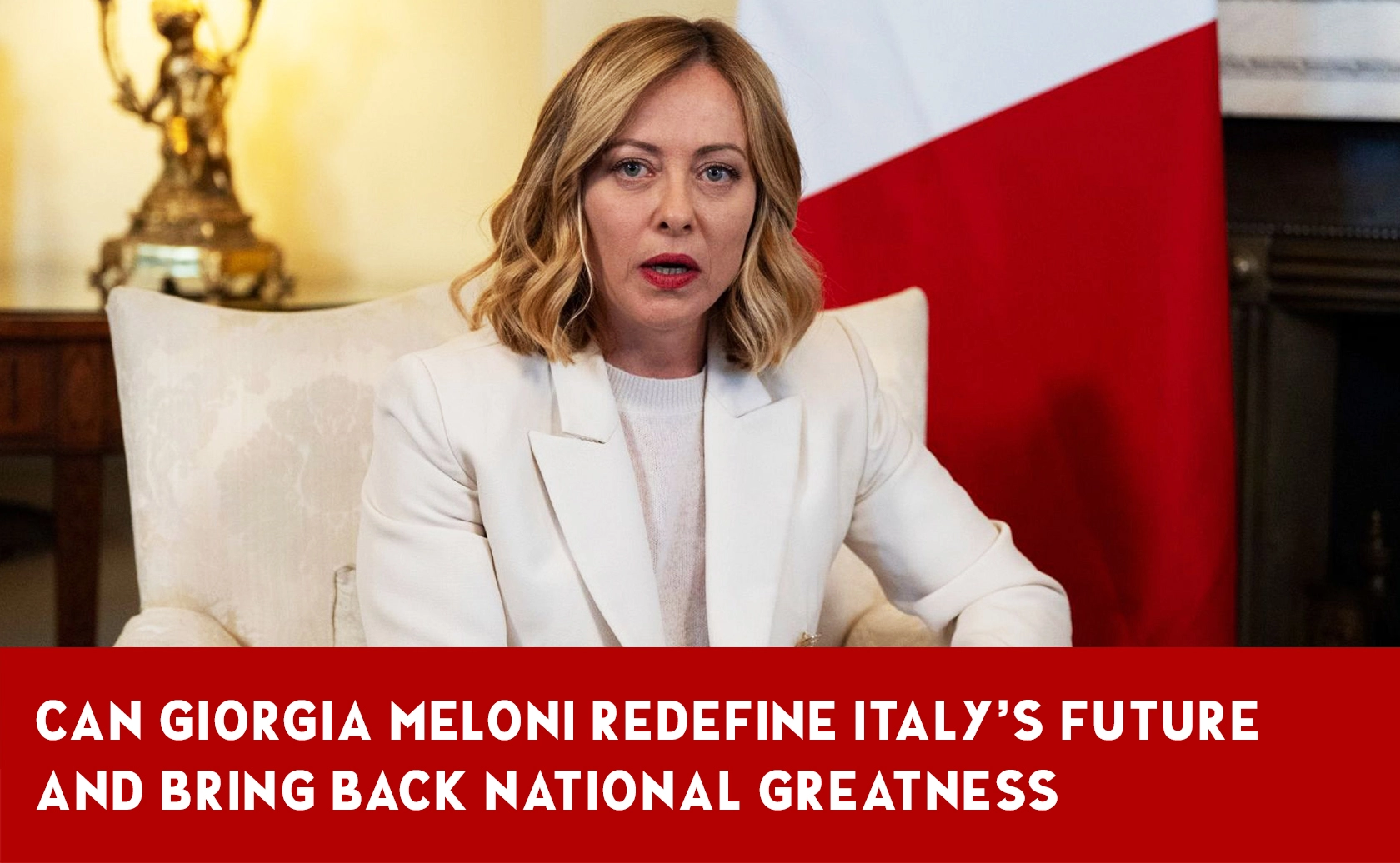Giorgia Meloni’s ascent to Italy’s premiership in 2022 marked a seismic shift in the nation’s political landscape. As the leader of the Brothers of Italy (FdI), a party with post-fascist roots, Meloni promised to restore Italy’s economic vigor, curb illegal immigration, and reclaim national sovereignty from EU overreach. Yet, nearly three years into her tenure, the question looms: Has her government delivered on its vision to “make Italy great again,” or has it faltered under the weight of internal contradictions and policy inefficiencies? This article critically examines Meloni’s governance, probing the gaps between her rhetoric and reality, and assessing whether her blend of nationalism and pragmatism can truly revitalize Italy.
Table of Contents
ToggleThe Meloni Doctrine: Nationalism Meets Pragmatism
A Dual Approach to Governance
Giorgia Meloni’s government has been characterized by a Janus-faced strategy: combining hardline conservative policies on immigration and cultural issues with cautious pragmatism in economic and international affairs14. On one hand, her administration has championed traditional family values, restricted LGBTQ+ rights, and vowed to stem the flow of migrants across the Mediterranean. On the other, it has adhered to EU fiscal rules, maintained Italy’s pro-Ukraine stance, and avoided the budgetary recklessness some feared from her nationalist coalition4.
This balancing act reflects both political necessity and ideological evolution. Meloni’s coalition partners—Matteo Salvini’s League and the late Silvio Berlusconi’s Forza Italia—have tempered FdI’s far-right tendencies, pushing her toward moderation on issues like EU relations1. However, this duality has also bred policy ambiguities. For instance, while Meloni publicly aligns with European conservatives like Poland’s Law and Justice (PiS) party, her government has simultaneously cooperated with EU institutions on recovery fund reforms14. Critics argue this inconsistency undermines her credibility, portraying her as a leader more focused on political survival than principled governance4.
Economic Restraint vs. Populist Promises
Meloni’s economic policies have drawn particular scrutiny. Despite campaigning on tax cuts and increased welfare spending, her government has pursued fiscal restraint to appease financial markets and EU partners4. Italy’s public debt, which stands at 147% of GDP, has constrained her ability to fulfill populist pledges, forcing her to dilute or abandon key proposals4. For example, a promised “citizen’s income” reform targeting unemployment benefits was scaled back to limited workfare programs, leaving many low-income Italians disillusioned4.
While this pragmatism has stabilized Italy’s economy—avoiding the bond market crises that plagued earlier governments—it has also alienated her base. Small business owners and working-class voters, core supporters of FdI, have criticized the lack of tangible relief amid rising inflation and energy costs4. Meloni’s inability to reconcile her nationalist rhetoric with economic realities highlights a central tension in her governance: Can she truly “make Italy great again” while adhering to the very EU frameworks she once denounced?
Immigration: A Broken Promise
The Lampedusa Crisis and Policy Failures
No issue has exposed Meloni’s inefficiencies more starkly than immigration. Elected on a pledge to “stop the boats,” her government has instead presided over a surge in migrant arrivals. In 2023, a record 125,928 migrants reached Italian shores, up from 67,477 in 20213. The September 2023 Lampedusa crisis, where 19,000 migrants overwhelmed the island’s resources, became a symbol of her policy failures3. Local officials decried the lack of EU support and Meloni’s inability to secure bilateral agreements with North African states to curb departures3.
Meloni’s response has been a mix of performative toughness and diplomatic pleading. She allocated funds to build detention centers in Albania—a legally dubious move challenged by human rights groups—and lobbied the EU for a naval blockade34. Yet these measures have done little to address root causes, such as instability in Libya and Tunisia. Meanwhile, her government’s focus on border enforcement has come at the expense of integration programs, exacerbating social tensions in cities like Rome and Milan3.
The Limits of Sovereignty
Meloni’s immigration struggles underscore a broader dilemma: Italy’s reliance on EU cooperation to manage a transnational crisis. Despite her nationalist rhetoric, she has been forced to seek EU funding and burden-sharing agreements, revealing the limits of unilateral action4. This dependency has frustrated her base, with far-right factions within FdI accusing her of capitulating to Brussels1. The disconnect between her sovereigntist ideals and the pragmatic need for multilateral solutions has become a recurring theme—one that weakens her claim to restoring Italian greatness through sheer political will.
EU Relations: Pragmatism Over Confrontation
From Euroscepticism to Cautious Collaboration
Meloni’s EU strategy has been a study in calculated moderation. While early fears of an Italo-EU clash have not materialized, her government’s achievements in reshaping European policy remain modest. She has pushed for flexible fiscal rules and expanded EU investments in migration and defense, aligning with Italy’s traditional priorities4. However, these efforts have yielded limited results, with northern member states resisting debt rule reforms and joint borrowing4.
Her most notable impact has been in shifting the EU’s ideological balance. By allying with conservative leaders in Poland and Hungary, Meloni has amplified calls to roll back green policies and strengthen border controls15. Yet her influence is often overstated. The European Conservatives and Reformists (ECR), her parliamentary group, remains a junior partner to the dominant European People’s Party (EPP)5. While her strong showing in the 2024 EU elections solidified her domestic standing, it has not translated into a decisive conservative bloc capable of dictating EU agendas5.
The Green Policy Dilemma
Meloni’s opposition to EU climate measures illustrates the tension between ideology and economic pragmatism. Her government has sought exemptions from the Green Deal’s emissions targets, arguing they harm Italian industries4. Yet, with the EU tying recovery funds to green reforms, Meloni has reluctantly endorsed renewable energy projects to access vital subsidies4. This contradiction—denouncing “climate fanaticism” while complying with EU mandates—has disappointed both environmentalists and her nationalist base, further muddling her policy legacy.
Social Policies: Culture Wars and Backlash
Traditionalism in a Modernizing Society
Meloni’s social agenda, centered on “God, family, and fatherland,” has ignited fierce cultural battles. Her government has restricted same-sex parental rights, promoted traditional gender roles, and cut funding for LGBTQ+ advocacy groups1. These measures, while popular with conservative voters, have sparked widespread protests and condemnation from the European Parliament1.
The backlash highlights a generational divide. Younger Italians, particularly in urban areas, increasingly support progressive social policies, with 63% favoring marriage equality in recent polls1. Meloni’s retrograde stance risks alienating this demographic, undermining her long-term political viability. Moreover, her focus on cultural issues has diverted attention from pressing economic challenges, such as youth unemployment and stagnating wages3.
Political Challenges: Coalition Strains and Electoral Risks
Governing a Fractured Right
Meloni’s coalition remains fragile, beset by rivalries between FdI, the League, and Forza Italia. Salvini’s League, once the dominant right-wing force, has chafed at playing second fiddle, occasionally undermining Meloni’s authority on issues like tax reform14. Meanwhile, Forza Italia’s moderate wing has clashed with FdI hardliners over EU policy, forcing Meloni to mediate between conflicting agendas1.
These tensions have slowed legislative progress, particularly on Meloni’s signature policies. A proposed constitutional reform to centralize executive power, for instance, has stalled amid coalition infighting1. Such gridlock raises doubts about her ability to enact the transformative changes needed to “make Italy great again.”
Electoral Setbacks and Rising Discontent
Recent regional defeats in Emilia-Romagna and Umbria signal growing voter impatience2. While FdI remains Italy’s most popular party, its support has plateaued at 28%, with many Italians criticizing the slow pace of reform5. Meloni’s reliance on symbolic gestures—such as invoking Italy’s ancient Roman heritage—has done little to address everyday concerns like healthcare access and infrastructure decay2.
Conclusion: The Illusion of Greatness
Giorgia Meloni’s tenure has been marked by paradoxes: a nationalist leader constrained by global realities, a reformer hamstrung by coalition politics, and a populist compelled to embrace technocratic moderation. While her government has stabilized Italy’s economy and elevated its geopolitical profile, these gains are fragile and incremental—far from the transformative revival she promised.
Her failure to curb immigration, deliver economic relief, or reshape the EU underscores the limits of her doctrine. Italy’s greatness, it seems, cannot be restored through rhetoric alone. It requires coherent policies, international cooperation, and a vision that transcends cultural warfare. As Meloni navigates her remaining term, the specter of unmet expectations looms large—a reminder that even the most skilled political performers cannot balance on a tightrope forever.
The path to national renewal demands more than nostalgia for a mythic past; it requires grappling with the complexities of a modern, interconnected world. Whether Meloni can bridge this gap remains her greatest unanswered question.




